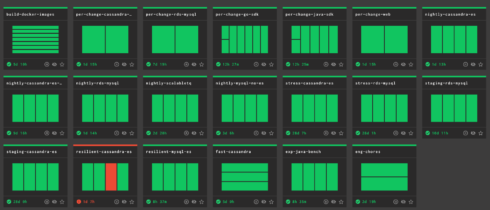
Open-source microservices orchestration platform provider Temporal announced a series A $18.75 million round of funding, bringing the company’s total amount raised to $25.5 million. According to the company, the funds will be used to expand the platform, grow its open-source community, and develop a cloud offering.
“Aside from being a reasonably good way to support the company, we strongly believe that the requirement to run Temporal is one of the biggest barriers of adoption today. Having a cloud solution will make it much easier for new users to get started with Temporal and therefore enable us to continue growing this already great community,” Ryland Goldstein, head of product at Temporal, wrote in a blog post.
Prior to starting Temporal, CEO Maxim Fateev and CTO Samar Abbas created and led the open-source project Cadence at Uber, which is a distributed orchestration engine. Through their work, they noticed developers struggling with microservices orchestration and short-lived transactions. According to Fateev, with microservices and short-lived transactions, typically you make a request and expect it to faith fail or compete within milliseconds or seconds. If the operation takes longer than expected, there is nothing to help developers address that. “This is exactly the problem we are trying to solve. We make any operations from short to very long ones reliable and very easy with a very simple programming model for developers,” Fateev told SD Times. “We understand that it’s not only about how you develop the full application life cycle. But it’s how you run these things in production, how you monitor them, how you get visibility, and how you troubleshoot things.”
The round of funding was led by Sequoia Capital and included Madrona Venture Group, Addition Ventures and Amplify Partners.
“Today, developers spend too many hours writing and debugging custom code to mitigate potential failures across microservices,” Bogomil Balkansky, partner at Sequoia. “Temporal provides resiliency out of the box, enabling developers to build scalable applications and making it an essential component of any microservice architecture.”
The company also recently announced version 1 of Temporal gas reached stability and is now available. “This is a huge milestone for the project, community and Temporal as a business. Without our community, Temporal would have never existed. For all of you who have been waiting or blocked by this release, your patience is appreciated. This release served as a learning process for the Temporal team and we hope that it reflects in our future behavior,” Goldstein wrote. The version 1 release includes backwards capability, and improvements on how shard IDs are hashed. The team plans to add a deprecation policy in the near future. Experimental features of version 1 include archival, cross data center replication, batch operations, dynamic config and addition, removal and creation of searchable attributes with ElasticSearch.
Going forward, the team plans to add new support for languages, databases and security capabilities as well as more engagement with users through meetups, conferences and design sessions.
“We are creating a new category of software. It changes the way applications think about how to approach the problem. How to architect the solution. How to design it. It’s not just another framework. It completely changes the way you think about distributed system,” said Fateev.






